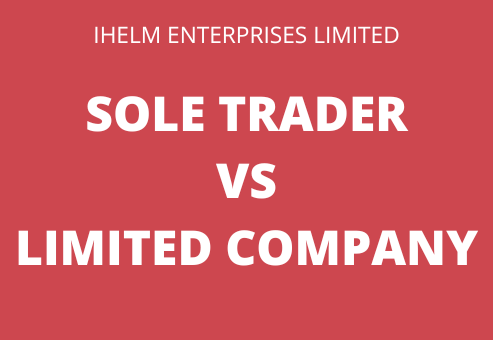During the June 2022 Facebook Live, I talked about the differences between sole traders and limited companies.
What is a sole trader (self-employed)?
A sole trader runs the business as their own and owns everything the business has – the profit of the business is their income. As you and the business are the same legal entity, you are responsible for any debt the business has. You are also responsible for registering with HMRC as self-employed, filing a self-assessment tax return every year, paying tax on all the profits and paying your own NI Contributions.
What is a limited company?
A limited company is owned by shareholders and run by directors. It is a separate legal entity. Everything relating to the limited company is separate from your personal finances and the company is responsible for its own debt. Any profit the business makes belongs to the company, and it must file a corporation tax return at the end of the financial year. The company must also file annual accounts with Companies House each year.
What other differences are there between a sole trader and a limited company?
Business Name – The name of a self-employed business is not protected. There can be a lot of businesses using the same name as you, and you would not be able to do anything. However, the name of a limited company is protected and that means that in the UK, there can only be one company by that name. It is possible that if someone sets up a limited company, and you have been running a self-employed business with the same name, they could require you to change it. It is a very good idea to check the name you want to use for the business on Companies House to make sure it isn’t registered. Some sole traders even set up a dormant limited company to protect their name. This is the link to the Companies House website.
Responsibility – A sole trader is 100% responsible for making all the decisions about their business and for ensuring all legal requirements are met. This can be a good thing as you don’t have to ask anyone else for permission to implement an idea, but it can also be a downside. As you are the only person responsible, even if you have staff, you still have to spend many hours making sure everything is running as it should, and you often have to wear many hats as you try to do everything.
As there is usually more than one person involved in a limited company, though there are many sole-director companies, the decision-making and responsibility for the day-to-day running of the company is spread across more people. However, if you are running a sole-director company, then like a sole trader, the responsibility relies solely with you.
Admin – There is a lot less admin involved for a sole trader. You need to keep accurate records for your accounts, but you then only need to submit a self-assessment at the end of the tax year. However, once MTD ITSA comes into play in 2024, you will be required to submit information to HMRC on a quarterly basis, though if your accounts are up to date it should be fairly straightforward.
A limited company, on the other hand, has a lot more admin to deal with. At the end of the year, a Corporation Tax Return must be filed with HMRC, the accounts must be submitted to Companies House, and each director may have to submit a self-assessment tax return. The company must also submit an annual return to Companies House every year, verifying the information on file.
Taxation – When it comes to being self-employed, as long as you have no other income, the tax side is relatively straightforward. You will be liable for paying tax on any profit over the personal annual allowance, which for this tax year is £12,570.00. For any profit between £12,571 and £50,270 you will pay 20%, for any profit between £50,271 and £150,000, you will pay 40% and for any profit over £150,000 you will pay 45%. You will also need to pay Class 2 NI which you pay on any profit over £6725 which is £3.15/week for this tax year. You may also be required to pay Class 4 NI which will be 10.25% on any profits between £9,881 and £50,270. If you have profits of over £50,270 you will pay 3.25%.
If you are a limited company, things are a bit more rigid. There are stricter rules about what allowable expenses can be claimed and directors cannot freely take money out of the business. For every pence of profit, a limited company makes, in the 2022/2023 tax year they will pay 19% in Corporation Tax. This rate will be going up to 25% for companies with profits over £250,000 from April 1st, 2023. If the limited company pays dividends to its shareholders, each shareholder will have to pay tax on any dividends received that are over the £2000 limit. The amount of tax paid will depend on the individual’s income. Each director may then also have to pay tax to HMRC when they file their self-assessment, depending on how they received money from the company, whether they have any other income and whether they received any dividends.
This is just a brief overview of some of the differences between a sole trader and a limited company.
If you would like further information about the differences between a sole trader and a limited company, feel free to e-mail me.

